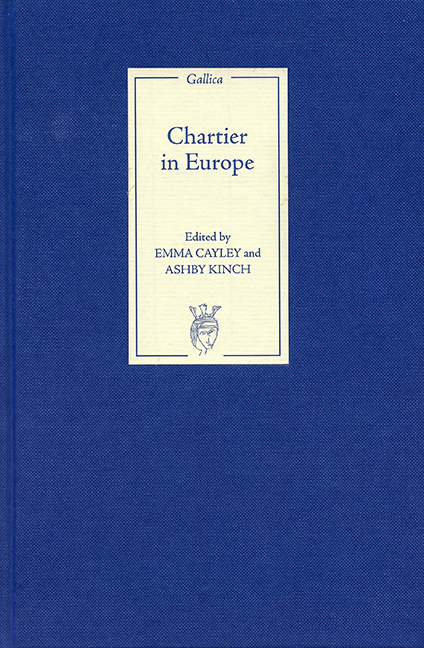Book contents
- Frontmatter
- Contents
- Foreword
- List of Contributors
- Acknowledgements
- List of Abbreviations
- Introduction
- Part I Authorising Chartier
- 1 Boethius as Model for Rewriting Sources in Alain Chartier's Livre de l'Esperance
- 2 ‘Vox Dei, vox poetae’: The Bible in the Quadrilogue invectif
- 3 ‘Car rompre vault pis que ployer’: Proverbial Pleasure in La Belle Dame sans mercy
- 4 Alain Chartier's Livre des Quatre Dames and the Mechanics of Allegory
- Part II Transmitting Chartier
- Part III Translating Chartier
- Bibliography
- Index
- Miscellaneous Endmatter
3 - ‘Car rompre vault pis que ployer’: Proverbial Pleasure in La Belle Dame sans mercy
from Part I - Authorising Chartier
Published online by Cambridge University Press: 24 October 2017
- Frontmatter
- Contents
- Foreword
- List of Contributors
- Acknowledgements
- List of Abbreviations
- Introduction
- Part I Authorising Chartier
- 1 Boethius as Model for Rewriting Sources in Alain Chartier's Livre de l'Esperance
- 2 ‘Vox Dei, vox poetae’: The Bible in the Quadrilogue invectif
- 3 ‘Car rompre vault pis que ployer’: Proverbial Pleasure in La Belle Dame sans mercy
- 4 Alain Chartier's Livre des Quatre Dames and the Mechanics of Allegory
- Part II Transmitting Chartier
- Part III Translating Chartier
- Bibliography
- Index
- Miscellaneous Endmatter
Summary
Like many of Alain Chartier's works, La Belle Dame sans mercy tells its story of thwarted love through dialogue or debate, medieval genres that thrived on the use of proverbial expressions, legal language, and a sententious style. The poem revolves around a dispute between a lover and his beloved (Amant and Belle Dame) overheard by an ‘eyewitness’ narrator who records the debate. Although one critical thread has centered on the poem's supposed conventionality and unoriginality of expression, and others have investigated the use of courtly language and intertextual play, scholars have not investigated the pleasures of the poem's use of proverbs and sentences. Giuseppe E. Sansone comes closest when he assesses the appeal of Chartier's poem as the result of ‘its nature as an exemplary and at the same time problematic work’, suggesting that the problematic elements give the poem its particular pull – for readers then and now. But the overwhelming use of proverbial language in Chartier's poem signals an interest in conventional language and tropes, sources of enjoyment for medieval and early modern audiences that prove harder to accept for later readers weaned on the importance of originality and innovation. Hans Robert Jauss argues that modern readers, who think highly of newness rather than tradition, must reconstruct ‘the horizon of expectations’ for the original audiences of medieval works, a reconstruction requiring ‘a reversal of [modern] aesthetic expectations’. Reading conventional medieval works requires ‘the reader [to] negate the character of the individual text as a work in order to enjoy the charm of an already ongoing game with known rules and still unknown surprises’. Reproducing proverbial language in a literary context creates just such a mixture of ‘rules’ with ‘surprises’. Examining the manipulation of proverbial language in the debate reveals that the pleasures of proverbs stem from the tension they offer as recognizable, common sayings that carry with them unexpected surprises through their reprise in the debate structure (in the form of reprisals). The intricacy of the verbal games in BDSM centers on the use of sententious language manipulated in a proverbial tour de force, offering readers the delight of the known mingled with the unknown, the familiar turned strange – Jauss's ‘known rules and still unknown surprises’ taken to another level.
- Type
- Chapter
- Information
- Chartier in Europe , pp. 45 - 60Publisher: Boydell & BrewerPrint publication year: 2008

